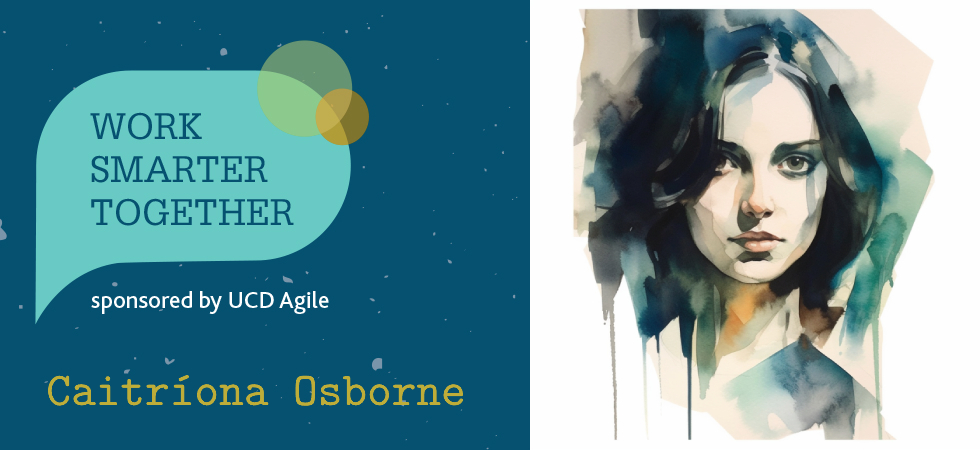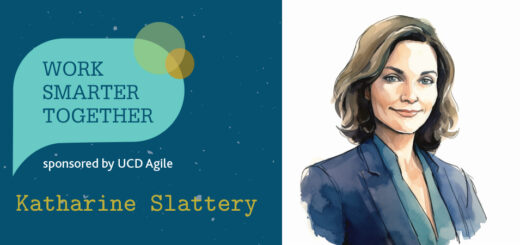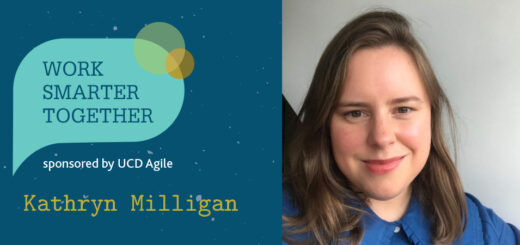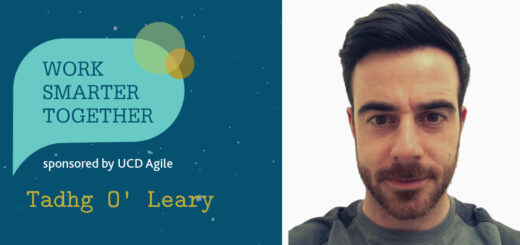A Day in the Life – Dr. Caitríona Osborne
 Who are you?
Who are you?

Dr. Caitríona Osborne
Dr Caitríona Osborne, Assistant Professor in the Irish Institute for Chinese Studies.
How did you get here? What was the journey to UCD?
I always had a passion for languages and started learning Chinese when I began my undergraduate course in university (applied languages and translation studies in DCU). I had no experience learning a non-alphabetic language, but I was hooked from the beginning. After graduating in 2014, I completed my MA in translation studies in 2015. During this time, an opportunity to complete a PhD was presented to me. I was hesitant, but having grappled with the complicated writing system, I wanted to examine various teaching methods that could potentially assist beginner learners of Chinese. After successfully completing my PhD in July 2019, I was delighted to begin my role as Assistant Professor in the Irish Institute for Chinese Studies (IICS) in August 2019, meaning that I could now support students in their journey of learning Chinese while also preparing future teachers of Chinese to adequately support their students.
What is your role within UCD, and what are your main responsibilities?
The main modules I teach are 1) the beginner Chinese language modules at undergraduate level and 2) teaching methodology modules at post-graduate level. There are three main aspects to my role that are teaching, research and administration. For teaching, this involves preparing my material and delivering such, while also designing and notifying students of upcoming assignments. With my research, this could involve all stages from developing ideas, writing funding applications, writing papers, or reviewing corrections for accepted papers. Finally, administration could include correcting student work, responding to student queries, report/form writing for the IICS, and planning the year ahead in terms of module design and timetabling.
Could you briefly describe what a typical day looks like for you?
A typical day usually begins with answering any emails that I have received from students and/or colleagues before working on research or administration tasks. I prepare for teaching by checking my slides are in order and that all additional materials are ready, and after class I may have one-to-one meetings with students or colleagues. I like to prioritise one day a week for research, but my days will generally also involve teaching and admin.
What are some of the most interesting or challenging tasks you encounter on a regular basis? Why are they unavoidable?
I feel so fortunate to be in a career that remains interesting and challenging on a daily basis. Whether it is student support, a complicated administration task or a research question that needs teasing out, I truly enjoy every aspect of my job. No matter how stressful or challenging it gets, I am always grateful to be in this position and to be making a real difference to the student experience.
Are there any specific projects or initiatives you or your unit are currently working on that you would like to share?
After receiving funding from the 2021 Global Engagement Seed Fund to investigate the teaching of Chinese characters in an era of online learning (with Dr Qi Zhang in DCU and Dr Danping Wang in the University of Auckland), I led a 10-week seminar series in autumn 2022 with a keynote speaker delivering a talk each week. The series brought together Chinese experts from around the world and attracted over 400 attendees, and a co-edited book based on the series is in the works with 11 experts from the field of teaching Chinese as a foreign language contributing to chapters. I will also author a chapter based on findings from research conducted in 2021-2022 on the student perspective of the present and future of teaching Chinese characters online.
Is there a process or element of your work that you would improve or change?
We had a lot of practice with this question during Covid-19! Transferring all learning to the online space was incredibly difficult for students. We ran synchronous classes as needed for a language class, but it highlighted many barriers that students face in studying for their degree. We were constantly adapting our assessment methods and online set-up according to student needs and feedback, but it was a difficult time for all. Thankfully, we are back to the classroom now, and the lessons learned during the pandemic have certainly helped and been applied to this new hybrid setting.
Could you share a memorable experience you’ve had while working in your role?
Being the first role I have worked in after completing my PhD, my first year in its entirety was memorable. In particular, receiving feedback from students after delivering a beginner Chinese language module was a wonderful feeling. Seeing the students taking the time to comment on their positive experience in my classroom and highlight all the points that I had been working towards improving in my PhD research was a full-circle moment for me. That I could implement certain teaching methods and therefore positively impact student learning was a very proud moment for me, and is something that I continuously strive to maintain.
Is there a particular skill or expertise that helps you in your role and what advice would you give to someone joining your unit?
There are so many wonderful pieces of advice that I could give, but I think the most important ones to remember at all times and in every task are:
- To always put the students first.
- To be open to learning at all times.
- To recognise and acknowledge our privilege.
How do you collaborate with other teams or colleagues in your day-to-day work?
As a small unit, we work closely with our partner programme schools and units as well as colleagues from Global Engagement. In my own research projects, the reality is that nearly every day I speak to colleagues around the world in Ireland, the UK, the US, China and New Zealand.
Are there any common misconceptions about your role?
That we have the summers off! There is great flexibility in the role, but we are working away over the summer months, and for some colleagues it is even the busiest time.
How do you see your job changing over the next ten or twenty years?
It is an interesting one for me specifically with advances in technology leading to handwriting being used less in daily life (meaning that the teaching of handwriting in Chinese is under scrutiny in the research). ChatGPT has also caused a stir in recent months. While we will undoubtedly adapt our teaching to these changes, there will always be a need for synchronous learning and human connection with languages.
What is an achievement big or small you’ve had while in this role?
My most notable achievement was being awarded a UCD College Level Teaching Excellence Award for the year 2021-2022. I was nominated by a student who stated the following in their nomination:
Caitríona is an all round great teacher. She is enthusiastic, kind welcoming. She is especially good at taking complicated grammar concepts and breaking them down in a way that people who speak English as their first language can understand. [SIC]
The board commended me on my “dedication to teaching Chinese language and culture to students” and was “particularly impressed with [my] efforts to engage and motivate beginner learners and for [my] activities in teaching Chinese characters online.” As my main research area is related to teaching beginner learners of Chinese, I was delighted to receive this award and recognition from students and colleagues that my dedication to students is so evident in my practice, too.
If your job had a theme song or soundtrack, what would it be [and why]?
I think that it would have to be “Unwritten” by Natasha Bedingfield.
Firstly, it is a nod to the private joke that all academics understand – having plenty of research ideas but never sitting down to actually write the paper!
More importantly it touches on themes such as independence, autonomy, embracing life, and adventure – which is how I approach my career and what I hope to instil in my students during their university days and life thereafter.



